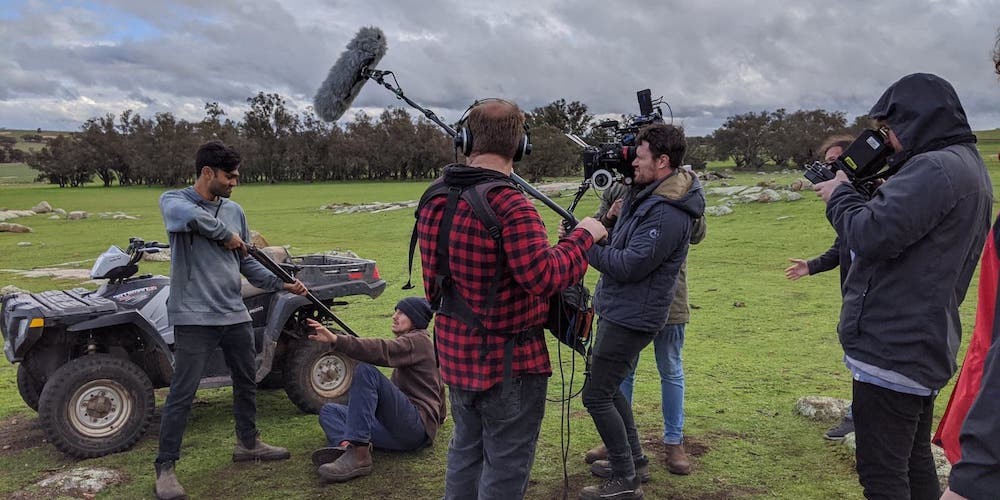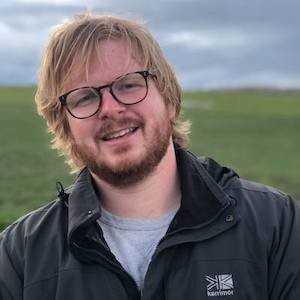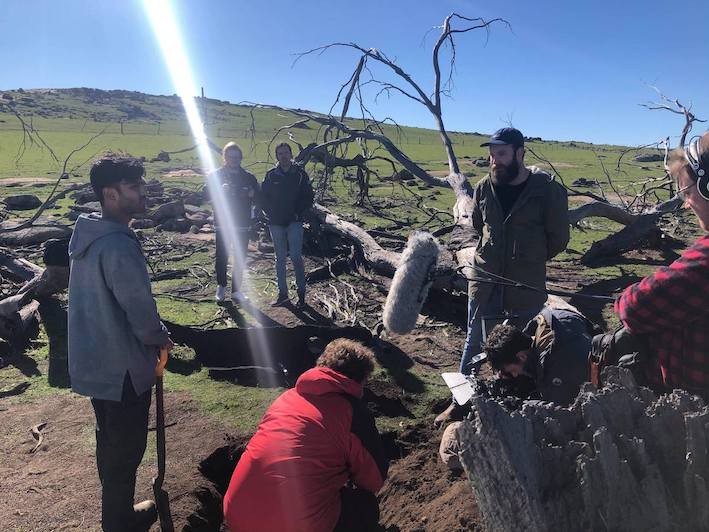On A Global Scale: How To Shoot in Australia During a Pandemic
On A Global Scale is a bi-weekly series about international co-productions by Columbia filmmakers.
Welcome to another edition of On A Global Scale. This bi-weekly series celebrates the international spirit of the Columbia University film program and the incredible global collaborations coming out of it.
When the pandemic struck last March, Australian student William Turner had a lot of time to think. “I was in quarantine for a month straight. When I arrived in Sydney, I was taken straight to a hotel handled by the authorities and was in a room for 14 days straight without leaving it at all,” he remembers. “After that I was allowed to go back to my hometown Perth in Western Australia where I had to do two more weeks of quarantine. At least there I was at home with a pool and a dog and a treadmill. It needed to be done, so it wasn’t all that bad.”
Once things started to heat up in New York, Turner realized it might be his best bet to sit out the pandemic in his home country. “I was aiming towards my D4 (Columbia’s end of year 2 project). It was set in a boxing gym, the least COVID-friendly space. That was scrapped pretty soon with the intention that maybe we could shoot later in the summer.” Of course, that didn’t happen and neither did the pandemic end. The whole film industry halted in response to the emergency. Columbia students like Turner suddenly found themselves far away from the privilege of working on a professional set with no plan to resume safely in sight.
So Turner decided to revisit old projects. “As a filmmaker stuck in isolation watching films, I was thinking about what I could be doing. I remembered my own feature script set in Australia that I’ve been working on at Columbia. So, I scrapped all D4 plans and developed the idea to shoot a proof of concept scene to support my feature instead. And the scene I was thinking of was all set outside with only two characters, so I thought it would be doable even given the extreme circumstances.”
The result is the short film Part Way East which Turner shot last summer in the Western Australian country side despite the obvious major COVID-19 complications. The short follows two friends who desperately try to dig a bush grave for a body stowed in their car when they are interrupted by an unsuspecting farm hand.
The feature for which the piece serves as a proof of concept is called Flooded Mine, a low budget genre piece which Turner wrote in his screenwriting class at Columbia as a potential first feature for him to direct as well. Luckily, it wasn’t hard for Turner to extract a fitting scene from it for his new purposes. “Thanks to the screenwriting strategies we learn here, my film has a clear sequence structure. So I could extract this distinct turning point in the middle while keeping it relatively self-contained.” Restless without a job or a future date when he could return to New York, Turner knew he needed to do something. “And then I figured I’m in the exact area where the feature is set. So, I wanted to take advantage of that while also cutting my teeth into the Australian film industry.”
Despite being an Australian native, Turner had little connection with the local film industry there. “In Australia, I studied law and I hated it. I ended up studying abroad in Denmark where everyone studied for free and they seemed a lot happier. There I realized: ‘I always wanted to work in film, so now’s the time to do it.’” Turner ended up going to film school in Denmark and finally graduated with a short film called Tide that he used to apply to grad school in the US. “I was back in Australia working as an Uber driver without many connections to the industry again when I found out I was accepted into Columbia.”
Consequently, Turner had never worked on a film in his home country prior to the pandemic. The first thing he had to do was to figure out his resources and assemble the troupe. “My friend has a farm outside Perth, a dirt bike, and a lot of the props required for the film. Casting during COVID was unthinkable, so I ended up casting my friends. The DP worked as a cameraman on a gardening show recently and jumped at the opportunity to get into the narrative realm. He knew some guys at a rental house that were open to giving him discounts. It was a lot of reaching out to see how far we can get.” What played in Turner’s favor was that there were less COVID cases and restrictions in Western Australia than in its Eastern counterpart. The local industry was eager to help since a whole year of Australian film festivals predominantly filled with Western Australian projects seemed likely. “We got great lenses which gives the short an almost film-like quality and we tailored the image to suit the uniqueness of the Western Australian landscape.”
Finally, a skeleton crew of six people and three actors got COVID tested twice and went into isolation before setting out on their journey. “We shot two and a half hours outside of Perth, in a town called Pingelly in the Wheatbelt on a large sheep farm. My friend’s brother lives there, but we didn’t see him once – he was working on other parts of the farm and obviously due to COVID concerns we didn’t want to stress anything. For budget and time reasons we could only shoot over the weekend. Hence, we shot it in two very intense days. On Saturday, we left in two cars at 5:00 am from Perth, arrived on set by 7:30 and shot by 8:30. We were using natural lights only, so we had to wrap at sunset. We spent the night at a local hotel with room service where we also didn’t interact with anyone. And at 6:00 am we were on set again, putting in another day’s work before driving back to Perth at night time on Sunday. It’s been really tough.”
Turner labels the experience “a great learning and bonding experience,” despite the effort making the film cost (upon his return to Perth, Turner went back into isolation in the so-called granny flat above his parent’s garage he could get tested again). His do-it-yourself attitude was also helpful in his interactions with the actors. Since they were his good friends, he was worried about the dynamic, but at the same time he was eager to explore this new realm. “I like to work with amateur actors in general and cast correctly for a role. In a sense they were amateur actors playing amateur criminals, so we used that to our advantage. They did phenomenal, especially since they are the people the characters were inspired by to begin with except maybe a little less murderous.”
The shoot also had an unexpected result on Turner: “When I first left Australia, studying for a degree I didn’t like, I was ready for a change of scenery. I appreciated my time away in Denmark and America so much, I didn’t give much thought to the fact that I wasn’t really establishing myself as an Australian filmmaker,” he admits. He’d be gone for years at a time, but coming back has instilled a new appreciation for his home country, one that grows more with each visit. “Especially over Christmas since it’s summer over there then.” The growing connection has also influenced Turner’s storytelling. “I find that stories about Australia come natural to me, the reflections of growing up there and exploring why I was so ready to leave have pushed forward in my awareness. The warmth I feel for it with the hindsight of being away makes the perspective on being an Australian filmmaker far more real.”
Now that the film is in the finishing stages of editing and Turner is back in New York, he and his producers, students Chidi Amadiumé and Dhane Taylor, are working on a festival strategy. “The idea would be to use it as a selling point for the feature while also submitting it to genre and domestic film festivals. It wasn’t a grand plan to resume my career in Australia, but the experience has been such a pleasure that it’s definitely grown more likeable.” And most importantly, he’s satisfied with the result. “It’s my nicest film by virtue of where I shot it. No one thinks of Australia in winter and how gray it gets. The location definitely sells it. It also gave me a better feel for what we still need to figure out for the feature if we ever get to that stage.” That would mean that Turner would work in Australia again, a task he is now much better prepared for than before the pandemic.


